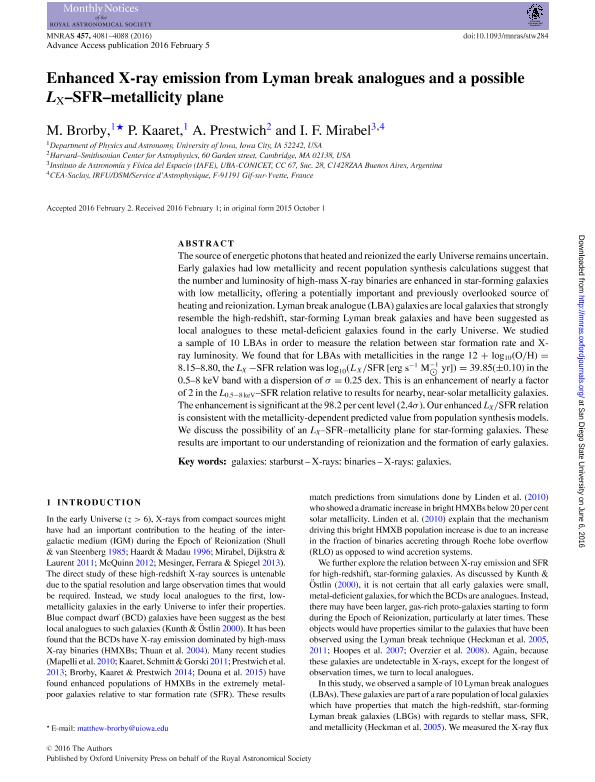Mostrar el registro sencillo del ítem
dc.contributor.author
Brorby, M.
dc.contributor.author
Kaaret, P.
dc.contributor.author
Prestwich, A.
dc.contributor.author
Mirabel Miquele, Igor Felix

dc.date.available
2017-06-16T14:21:21Z
dc.date.issued
2016-02-05
dc.identifier.citation
Brorby, M.; Kaaret, P.; Prestwich, A.; Mirabel Miquele, Igor Felix; Enhanced X-ray emission from Lyman break analogues and a possible LX-SFR-metallicity plane; Wiley Blackwell Publishing, Inc; Monthly Notices Of The Royal Astronomical Society; 457; 4; 5-2-2016; 4081-4088
dc.identifier.issn
0035-8711
dc.identifier.uri
http://hdl.handle.net/11336/18297
dc.description.abstract
The source of energetic photons that heated and reionized the early Universe emains uncertain. Early galaxies had low metallicity and recent population synthesis calculations suggest that the number and luminosity of high-mass X-ray binaries are enhanced in star-forming galaxies with low metallicity, offering a potentially important and previously overlooked source of heating and reionization. Lyman break analogue (LBA) galaxies are local galaxies that strongly resemble the high-redshift, star-forming Lyman break galaxies and have been suggested as local analogues to these metal-deficient galaxies found in the early Universe. We studied
a sample of 10 LBAs in order to measure the relation between star formation rate and Xray luminosity. We found that for LBAs with metallicities in the range 12 + log10(O/H) =8.15–8.80, the LX −SFR relation was log10(LX/SFR [erg s−1 M−1
yr]) = 39.85(±0.10) in the 0.5–8 keV band with a dispersion of σ = 0.25 dex. This is an enhancement of nearly a factor of 2 in the L0.5−8 keV–SFR relation relative to results for nearby, near-solar metallicity galaxies. The enhancement is significant at the 98.2 per cent level (2.4σ). Our enhanced LX/SFR relation is consistent with the metallicity-dependent predicted value from population synthesis models. We discuss the possibility of an LX–SFR–metallicity plane for star-forming galaxies. These results are important to our understanding of reionization and the formation of early galaxies.
dc.format
application/pdf
dc.language.iso
eng
dc.publisher
Wiley Blackwell Publishing, Inc

dc.rights
info:eu-repo/semantics/openAccess
dc.rights.uri
https://creativecommons.org/licenses/by-nc-sa/2.5/ar/
dc.subject
Rayos X
dc.subject
Metalicidad
dc.subject.classification
Astronomía

dc.subject.classification
Ciencias Físicas

dc.subject.classification
CIENCIAS NATURALES Y EXACTAS

dc.title
Enhanced X-ray emission from Lyman break analogues and a possible LX-SFR-metallicity plane
dc.type
info:eu-repo/semantics/article
dc.type
info:ar-repo/semantics/artículo
dc.type
info:eu-repo/semantics/publishedVersion
dc.date.updated
2017-06-13T14:14:34Z
dc.journal.volume
457
dc.journal.number
4
dc.journal.pagination
4081-4088
dc.journal.pais
Reino Unido

dc.journal.ciudad
Londres
dc.description.fil
Fil: Brorby, M.. University of Iowa; Estados Unidos
dc.description.fil
Fil: Kaaret, P.. University of Iowa; Estados Unidos
dc.description.fil
Fil: Prestwich, A.. Harvard-Smithsonian Center for Astrophysics; Estados Unidos
dc.description.fil
Fil: Mirabel Miquele, Igor Felix. Consejo Nacional de Investigaciónes Científicas y Técnicas. Oficina de Coordinación Administrativa Ciudad Universitaria. Instituto de Astronomía y Física del Espacio. - Universidad de Buenos Aires. Facultad de Ciencias Exactas y Naturales. Instituto de Astronomía y Física del Espacio; Argentina. CEA-Saclay; Francia
dc.journal.title
Monthly Notices Of The Royal Astronomical Society

dc.relation.alternativeid
info:eu-repo/semantics/altIdentifier/doi/http://dx.doi.org/doi:10.1093/mnras/stw284
dc.relation.alternativeid
info:eu-repo/semantics/altIdentifier/ark/https://academic.oup.com/mnras/article-abstract/457/4/4081/2589088/Enhanced-X-ray-emission-from-Lyman-break-analogues?redirectedFrom=fulltext
Archivos asociados
